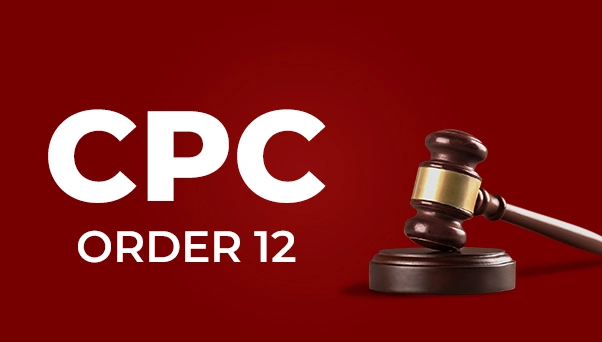Order 12 of the Civil Procedure Code (CPC) relates to the admission and denial of documents in legal cases. This rule applies when one party presents documents as evidence. The other side then has a chance to admit or deny those papers.
In India, the opposing party must clearly state which documents they admit or deny. If they deny a document, they must give valid reasons. Simply denying without explanation isn't allowed under Order 12. The court considers any document denied without reason as admitted.
Understanding Order 12 of the Civil Procedure Code:
Introduction
In civil cases, Order 12 of the Civil Procedure Code is essential. It outlines how parties admit certain facts. This streamlines trials by avoiding debates on agreed upon points. The process aims to save time and effort by focusing solely on disputed issues. Acknowledging undisputed facts makes proceedings more efficient.
What is Order 12?
Order 12 falls within the Civil Procedure Code, the law that guides civil legal proceedings in India. Its purpose is to facilitate admission of facts, a process where parties agree on certain undisputed points. By acknowledging accepted facts, parties can avoid unnecessary arguments and concentrate on genuine disputes, streamlining the legal process.
Key Provisions of Order 12
Order 12 outlines specific guidelines regarding admission treatment in civil legal proceedings. Several crucial rules are highlighted:
Rule 1 Admission Notice: Any party can issue a notice to another party, requesting admission of any document, barring valid exceptions. Unless the document is rightfully denied per appropriate rules, it becomes deemed admitted upon receiving such notice.
Rule 2 Judgment on admissions: The courtroom holds the authority to render its verdict based upon facts acknowledged by the involved parties. This signifies that if a crucial aspect pertinent to the case's resolution is conceded by one side, the court retains the jurisdiction to settle the dispute solely grounded on that concession, without necessitating additional evidence.
Rule 3 in Order 12 provides a broad guideline about the type of admissions permitted. It specifies that any fact relevant to the case, whether directly or indirectly, can be admitted unless prohibited by law. This rule aims to simplify matters by encouraging parties to admit undisputed or non-essential facts, narrowing down the key issues for litigation.
The scope of admissions under this rule is extensive. It encompasses any fact that might influence the outcome, whether central to the dispute or merely tangential. However, this expansive scope is limited by legal restrictions. Admissions that violate laws or regulations cannot be made. The underlying purpose is to facilitate the clarification and streamlining of case proceedings while operating within legal boundaries.
Rule 4 explains the specifics about how admissions are made and when they can be withdrawn.
Rule 5: Form of admissions
Rule 5 outlines the process for making admissions under Order 12. Admissions must be written and filed with the court. They should be clear and concise. They can occur anytime during proceedings, unless stated otherwise. This rule is vital because it formally records admissions as part of the court case. It also establishes a clear protocol for making admissions. This formalization prevents misunderstandings about admitted facts as the case progresses.
Additional Insight:
These guidelines enhance civil litigation procedures in several ways. Rule 3 allows the admission of a wide range of facts, helping concentrate on key issues requiring active litigation. This conserves time and resources for the court and involved parties. Simultaneously, Rule 5 mandates formal documentation of such admissions, lending integrity and clarity to legal proceedings.
Grasping the entire structure of Order 12, along with its regulations, equips litigants and legal professionals with valuable techniques for effectively handling their cases. Through skillfully acknowledging certain realities, the parties can concentrate their efforts and resources on the most disputed matters, potentially resulting in swifter and more advantageous resolutions to their legal conflicts.
Rule 6 Bearing Expenses for Rejected Evidence: Should one party decline acknowledging a document, yet the opposing party subsequently validates its authenticity, the court retains the authority to direct the party that initially rejected the document's admission to cover the associated costs incurred in proving its legitimacy.
Practical Application
Order 12 holds practical significance in civil lawsuits. Consider a property disagreement: one side sends a notice requesting the other party acknowledge certain documents' authenticity, like prior ownership records. If the opposing side agrees, the trial can then focus solely on other disputed matters, such as the current claim's legality. This streamlines the process, conserving time and judicial resources.
Clarity and Consequence
The strategic utilization of admissions under Order 12 holds profound implications for litigation proceedings. Legal professionals frequently employ this order as a tactical maneuver, acknowledging minor points while channeling their efforts into contesting more pivotal matters. This judicious approach not only streamlines the process but can also expedite resolutions, curb legal expenditures, and foster a more focused allocation of judicial resources.
Conclusion
The 12th Order of the Civil Procedure Code stresses the significance of efficiency and precision in legal proceedings. It allows parties to acknowledge facts, limiting the issues needing resolution, playing a vital role in streamlining justice delivery. This Order showcases procedural mechanisms designed to expedite and enhance dispute resolution, a cornerstone of India's civil justice system.
This comprehensive overview should provide a clear understanding of Order 12's function and importance in civil litigation. If you have any specific queries or require further information on any particular rule within Order 12, feel free to ask.
